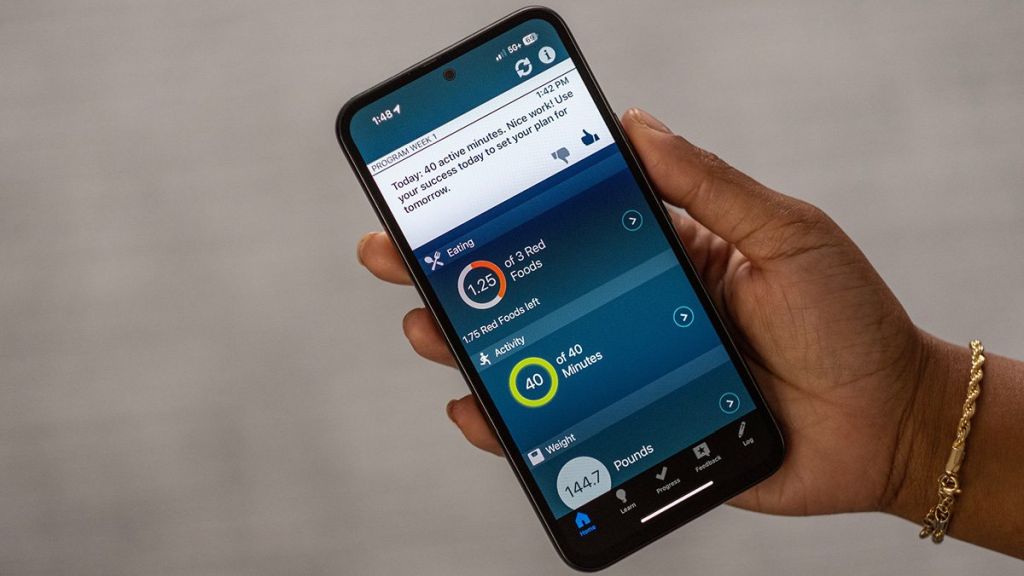In the last few years technology has completely changed the health and fitness industry. From personalized apps and wearable devices to AI-driven meal plans and virtual reality workouts, technology has changed the industry massively, but also found solutions that make achieving weight loss goals much easier and sustainable. Now, let’s look at how modern advancements are helping us achieve a healthier lifestyle.
Personalized Weight Loss Apps
Generic diet plans are long gone now. The main reason is because in today’s age we can use weight loss apps that will help you to create a diet plan for everyone’s preference. These apps analyze factors such as age, weight, activity level, and dietary preferences to create the best possible plan for you. Popular platforms like MyFitnessPal and Noom provide:
Calorie Tracking: Easy logging of meals and snacks.
Goal Setting: Tools to set and track weight loss milestones.
Behavioral Coaching: Insights into eating habits to build healthier routines.
What i also like about these apps is that you can track your progress very easy, and they are also easy to follow.
Wearable Devices for Real-Time Monitoring
Wearable devices such as fitness trackers and smartwatches have really helped with weight loss by providing real-time data on physical activity, calorie burn, and even sleep patterns. Brands like Fitbit, Garmin, and Apple Watch have features such as:
Step Counting: Encouraging daily movement to boost metabolism.
Heart Rate Monitoring: Helping users maintain optimal exercise intensity.
Sleep Tracking: Highlighting the importance of rest in weight management.
These apps can motivate users to stay active and also provide actionable steps that you need to take to improve your health.
AI-Driven Meal Planning and Nutrition
Artificial intelligence has gained a lot of attention recently in the world of diet and nutrition, and for a good reason. AI-powered platforms analyze user data to recommend meal plans that align with dietary preferences, allergies, and weight loss goals. Examples include:
Smart Grocery Lists: Apps suggest ingredients for healthy recipes.
Calorie Calculators: AI ensures balanced macronutrient intake.
Interactive Coaching: Virtual nutritionists answer questions and offer guidance.
If you’re having a hard time with making right food choices, these apps will make things easier for you.

Virtual Reality Workouts
Virtual reality (VR) is taking fitness to a new level by creating immersive workout experiences. If you don’t like going to the gym, then try using VR-based activities like boxing, dancing, or cycling through scenic routes. Benefits include:
Increased Engagement: Fun, gamified workouts prevent boredom.
Adaptable Intensity: Workouts can be tailored to individual fitness levels.
Convenience: Exercise from the comfort of home.
Using platforms like Supernatural and FitXR will make you enjoy your workouts more, if you prefer using VR.It’s definitely a fun experience and it’s worth trying.
Smart Scales and Body Composition Analysis
Normal scales can only show you the number, but smart scales will help you understand your body composition much better, it can even show:
Body Fat Percentage: Understanding fat loss versus muscle gain.
Muscle Mass: Monitoring strength-building progress.
Water Weight: Keeping hydration levels in check.
Using data from these devices can help you understand your body composition much better than with normal scale, but it can also show if you’re making progress or not.
If you’re still not making progress in losing weight, then supplements can be a great option. Supplements like semaglutide peptide can reduce your appetite and slow down your digestion which will help you to lose weight drastically. You can buy semaglutide peptide online and websites like PeptideShop offer it for a very cheap price. But keep in mind that diet plays a huge role in losing weight.
Telemedicine and Virtual Coaching
Virtual consultations with dietitians, fitness trainers, and doctors provide personalized advice without the need for in-person visits. Key features include:
Convenience: Schedule appointments from anywhere.
Continuous Support: Regular check-ins to stay accountable.
Holistic Care: Professionals address all aspects of weight loss, from nutrition to mental health.
Getting advice from professionals will help you to overcome all challenges along your journey.
Gamification of Weight Loss
Gamification adds an element of fun to the weight loss process. Apps and programs use rewards, challenges, and competitions to motivate users. Examples include:
Step Challenges: Compete with friends to reach daily activity goals.
Healthy Habits Rewards: Earn points for drinking water or cooking at home.
Streak Tracking: Maintain consistency with daily logs and activities.
By turning your weight loss journey into a game, it will help you be entertained, which means that you’re going to be more committed to weight loss journey.
Smart Kitchen Gadgets
Technology extends to the kitchen, where smart gadgets simplify meal prep and portion control. Tools like:
Smart Food Scales: Measure precise portions for calorie management.
Meal Prep Appliances: Devices like Instant Pots streamline healthy cooking.
Smart Refrigerators: Track ingredients and suggest recipes.
These innovations make it easier than ever to stick to a healthy diet.
Online Communities and Social Support
Weight loss is not just a physical challenge but also an emotional one. Online communities, forums, and social media groups provide a sense of belonging and motivation. Platforms like Reddit’s r/loseit or Facebook groups for weight loss offer:
Shared Experiences: Users can learn from others’ successes and setbacks.
Accountability: Publicly sharing goals encourages commitment.
Encouragement: Support from like-minded individuals boosts morale.
These platforms can be a game-changer for you.
Data-Driven Insights and Long-Term Success
The integration of technology into weight loss allows users to track trends over time. Insights from apps, wearables, and smart devices help identify patterns and adjust strategies for sustainable success. For instance:
- Identify triggers for overeating.
- Optimize workout schedules for better results.
- Monitor progress to celebrate milestones and stay motivated.
This data-centric approach ensures that weight loss efforts are informed, effective, and adaptable.
Final Thoughts
Technology has revolutionized weight loss by offering tools that are personalized, engaging, and efficient. Whether it’s through AI-driven meal plans, VR workouts, or wearable devices, these advancements make achieving and maintaining a healthy weight more accessible than ever.
However, while technology provides incredible resources, it’s essential to pair these tools with discipline, consistency, and a commitment to long-term lifestyle changes. By embracing the synergy of technology and personal effort, you can unlock a more sustainable and successful weight loss journey.

